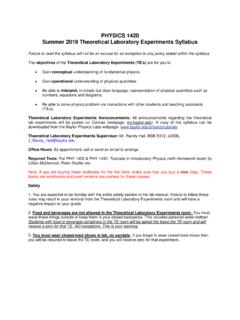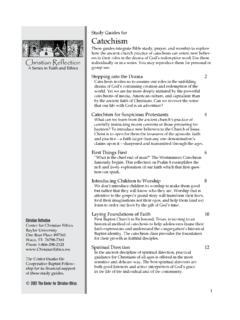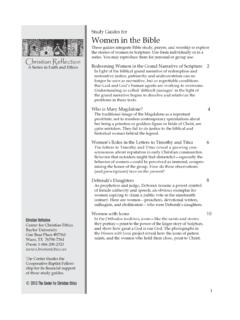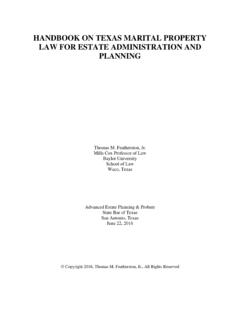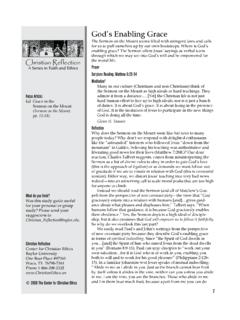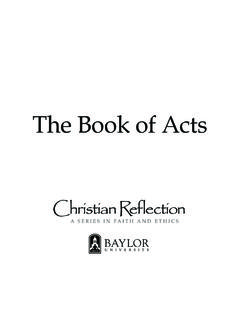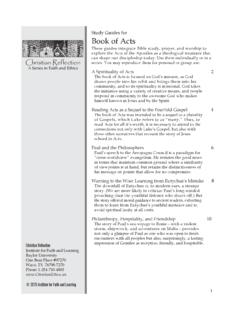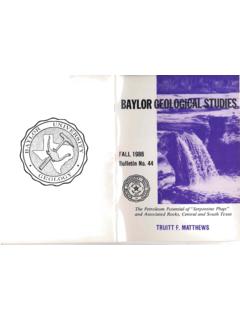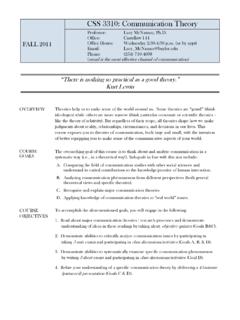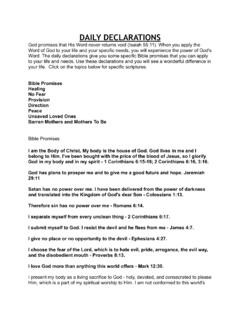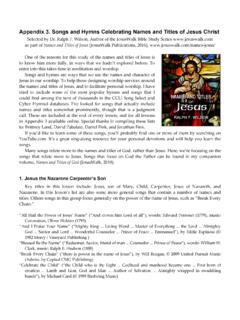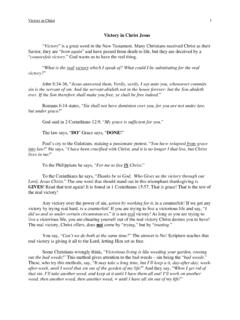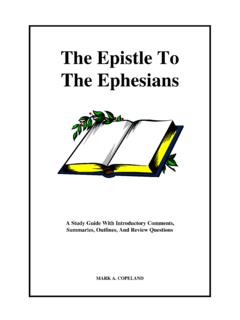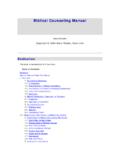Transcription of The Whole Creation Has Been Groaning - Baylor University
1 19 The Whole Creation Has Been GroaningBy Harry alan HaHneIn mysterious apocalyptic language, the apostle Paul describes the corruption of nature and expresses the cosmic scope of God s salvation in Jesus christ . What does it mean for us to participate now in God s redemp-tive activity that extends to the natural world?One of the most profound New Testament expressions of God s plan for the natural world is in Romans 8:19-23. It powerfully depicts the apocalyptic expectation that at the end of history God will reverse the damage from the Fall not only to humanity, but even to nature is a popular misperception that apocalypses are world-denying and pessimistic about nature. For the average person, the word apoca-lypse brings to mind the end of the world.
2 It is true that most early Jewish and Christian apocalypses have a dualistic or two age view of history. Apocalypses view the present age or world as corrupted by sin and in sharp contrast with the future perfect world or age of glory and Nevertheless, unlike Gnostic writings, biblical apocalypses such as Daniel, Isaiah 24-27, 65-66, and Revelation and most early Jewish apocalypses view the present material world as damaged by sin, but not fallen or inher-ently evil. Furthermore, they look forward not to the eventual destruction of the material world, but to its eschatological perfection and liberation from the damage caused by sin. From roughly 200 to 100 , many Jewish writers used apocalypses to express their struggle with the problem of evil and the expectation that 20 Apocalyptic Vision God would dramatically intervene to make things right at the end of histo-ry.
3 They often express an ecological concern for nature by stressing that the natural world was created by God and is under God s control. The sins of humans and fallen angels have defiled the earth and caused some aspects of nature not to operate as God originally intended. God holds humans and fallen angels accountable for their sins against the earth and animals. Nature is a victim of human and angelic sin and cries out in suffering, and in the coming new age, the natural world will be redeemed and transformed to a state of great Romans 8:19-23 the Apostle Paul reflects an apocalyptic perspective similar to this stream of Jewish apocalypses. He looks forward to the perma-nent eschatological transformation of Creation when christ returns.
4 The damage that the Fall caused to nature will be reversed and nature will be perfected, so that it shares in the glory of the resurrected children of God. Although this passage is part of a letter rather than an apocalypse (like the book of Revelation), nevertheless the worldview, the theology, and many expressions are very similar to those in Jewish apocalypses from the same It is one of the clearest expressions of what J. C. Beker calls Paul s expectation of the apocalyptic triumph of God. This apocalyptic perspec-tive emphasizes the hope in the dawning victory of God and the imminent redemption of the created order, which he has inaugurated in christ . 4 Paul s aPocalyPtic View of NaturePaul develops two major themes: the present corruption of nature is a result of the Fall of Adam and Eve, and the eschatological redemption of nature will free it from corruption and transform it to freedom and glory.
5 These themes are common in Jewish apocalypses from the same period. John Collins notes that the underlying problem of all the apocalypses [is that] this world is out of joint, one must look beyond it for a solution. He also observes that most Jewish apocalypses have an eschatological hope that God will intervene to remove evil and radically transform the Whole cosmos into a perfect new The pivotal interpretive question in Romans 8:19-23 is the meaning of the Greek word translated Creation (ktisis).6 Although in some contexts this word can refer to all that is created or an individual creature, in this passage it more narrowly means nature. Even though verse 22 refers to the Whole Creation , several aspects of the created order are incompatible with what Paul says about Creation in this passage: angels have not been subject-ed to futility or decay due to their sin or human sin (vv.)
6 20-21), demons will not be redeemed (v. 21) and they do not eagerly await the revealing of the children of God when christ returns (v. 19), heaven has not been subjected to futility or decay (vv. 20-21), and unbelievers do not eagerly await the reveal-ing of the children of God (v. 19), nor will all be delivered from the conse-quences of sin (v. 21). Some interpreters suggest that Christians are in view, The Whole Creastion Has Been Groaning 21since verses 17-18 mention the suffering and glory of Christians. However, even though ktisis occasionally refers to believers (2 Corinthians 5:17; Galatians 6:15), Paul distinguishes believers from the Creation in this passage: Not only the Creation , but we ourselves [ believers].
7 Groan inwardly (v. 23). When angels, demons, heaven, unbelievers, and Chris-tians are excluded from the meaning of ktisis, the part of Creation that remains is the subhuman material Creation or vividly depicts the present suffering of nature due to the Fall. The Creation was subjected to futility, not of its own will but by the will of the one who subjected it (v. 20). As a result, Creation is in bondage to decay (v. 20) and has been Groaning in labor pains until now (v. 22). Although the natural world is not itself fallen or disobedient to God, Adam s sin brought the created order into bondage to death, decay, corruption, and futility (vv. 20-21). The background for this passage is Genesis 3:17-19, which describes the curse on the ground due to the original human When God pronounced the curse after the Fall, God subjected Creation to futility and simultaneously gave hope of its eventual redemption through a descendant of Eve (v.)
8 20, in hope ; cf. Genesis 3:15). The Greek word translated was subjected (hupotass ) suggests an authoritative action, in this case the curse that God pronounced after Adam Whereas in Romans 5:12-19, Paul says that Adam s Fall brought sin and death to humanity, in Romans 8:20-22 he extends the impact of the Fall to the natural world. Thus, nature is not now in the condition it originally was when it was reason Adam s sin affected nature is that God gave humanity dominion over nature (Genesis 1:26-28). Since Adam was accountable to God to rule the earth and to tend the garden as a vice-regent under God, his sin affected the natural world for which he was Thus, nature became frustrated in its purposes and can no longer be all it was created to Paul describes this suffering of the natural world in the context of great eschatological hope for both believers and nature: The Whole Creation has been Groaning in labor pains until now (v.
9 22). The suffering of Creation is like birth pangs leading to a glorious new world, rather than the death pangs of a dying Creation . Throughout Scripture the metaphor of birth pangs points to an intense and prolonged pain that leads to a joyous and positive outcome. This bipolar metaphor The suffering of Creation is like birth pangs leading to a glorious new world, rather than the death pangs of a dying Creation . The intense pain leads to a joyous Apocalyptic Vision combines extended, intense pain with a better state of affairs in the future. Creation eagerly awaits the revealing of the children of God (v. 19), because at that time the natural world will be set free from its slavery to corruption (v. 21, NASB)11 and will be transformed to share in the free-dom of the glory of the children of God (v.
10 21). Thus, the redemption that christ brings will have cosmic consequences. At the Second Coming of christ when God s people are resurrected and glorified (vv. 19, 23; cf. 29-30), the natural order will be restored to its proper operation, so that it fulfills the purpose for which it was created. This passage strongly suggests that God will transform the existing Creation , rather than create a brand new world from scratch. When Paul says the Creation itself will be set free from its bondage to decay (v. 21), the phrase the Creation itself could be translated more literally as this Creation . The resurrection of the bodies of believers is part of this perfection of nature, for which both the material Creation and believers wait eagerly (vv.
